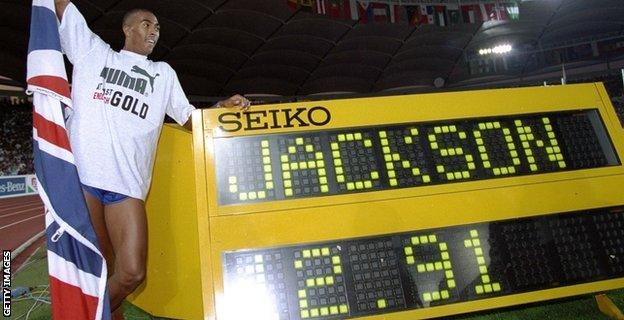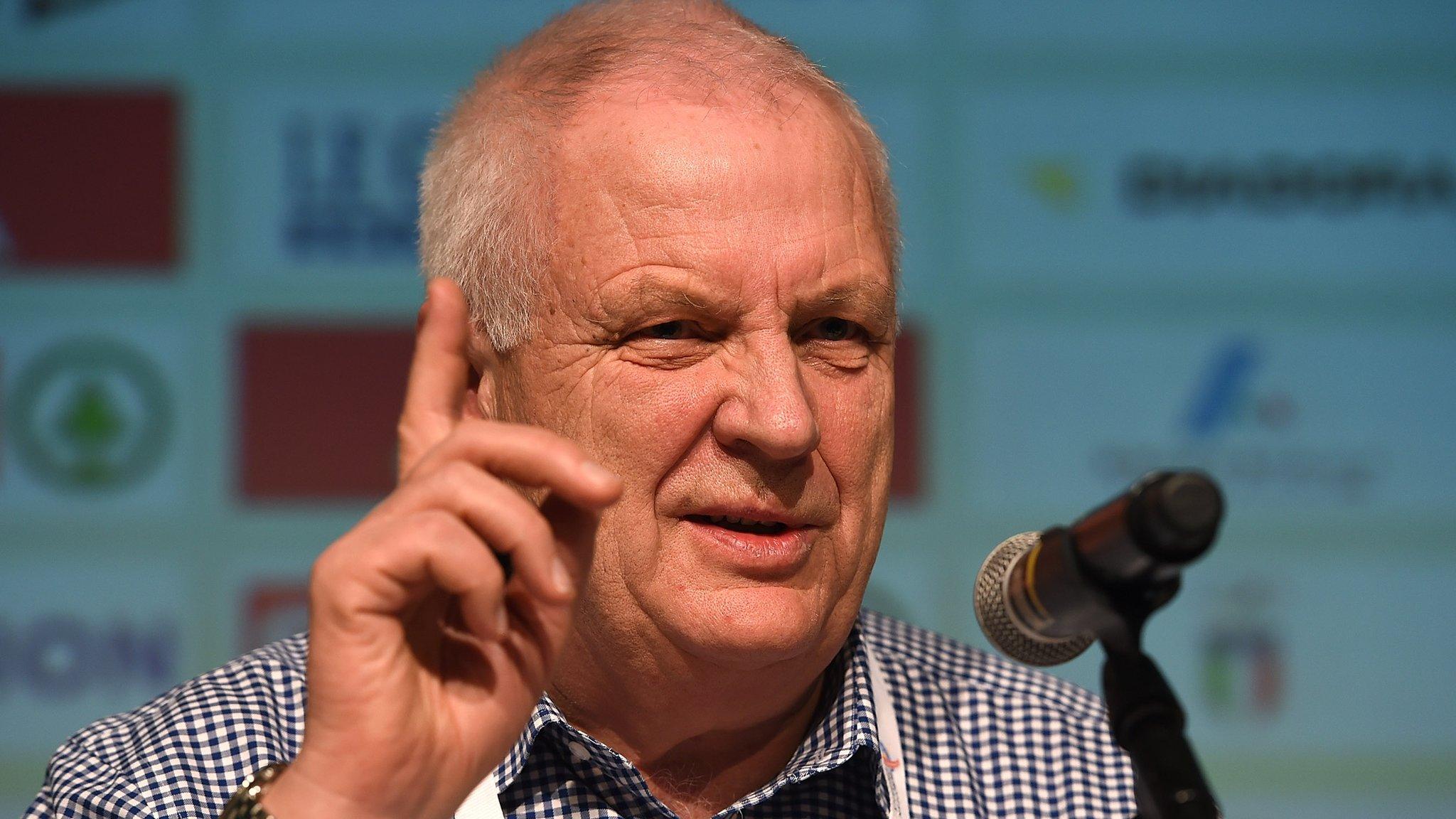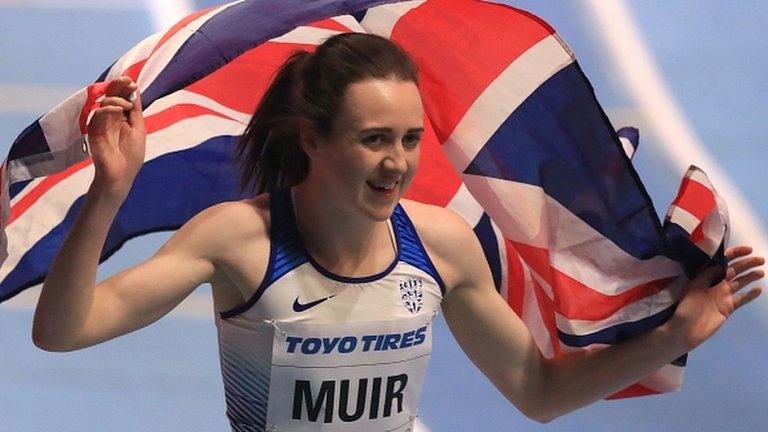European Athletics proposes rewriting athletics world records after doping scandal
- Published
Radcliffe criticises plans to wipe records
All athletics world records set before 2005 could be rewritten under a "revolutionary" new proposal from European Athletics.
The credibility of records was examined following the sport's doping scandal.
Britain's Paula Radcliffe, who faces losing her 2003 marathon world record, called the proposals "cowardly".
"I am hurt and do feel this damages my reputation and dignity," she said, adding that the governing bodies had "again failed clean athletes"., external
Svein Arne Hansen, the European Athletics president, said world records "are meaningless if people don't really believe them".
However, Radcliffe said the changes were "heavy handed" and "confusing to the public".
European Athletics set up a taskforce to look into the credibility of world records in January. Its ruling council has now ratified the proposals put forward by the taskforce, and it wants the sport's world governing body, the IAAF, to adopt the changes it sets out.
Desperate times call for desperate measures - Euro taskforce chief
How will world records be recognised?
If the proposals are accepted by the IAAF, a world record would only be recognised if it meets all three of the following criteria:
It was achieved at a competition on a list of approved international events where the highest standards of officiating and technical equipment can be guaranteed;
The athlete had been subject to an agreed number of doping control tests in the months leading up to it;
The doping control sample taken after the record was stored and available for re-testing for 10 years.
The IAAF has stored blood and urine samples only since 2005 and current records that do not meet the new criteria would remain on an "all-time list", but not be officially recognised as records.
This would include Jonathan Edwards' triple jump record of 18.29m - set in 1995 - and Colin Jackson's 1994 indoor 60m hurdles world record of 7.30secs, as well as Radcliffe's marathon mark of two hours 15 minutes and 25 seconds, set in 2003 using two male pacemakers.
Mary Keitany of Kenya broke Radcliffe's women's-only world record to win the 2017 London Marathon in two hours 17 minutes one second, the second-fastest time in history.
The council also recommended that a performance should be wiped from record books if the athlete had committed a "doping or integrity violation, even if it does not directly impact the record performance".
Why are the changes needed?
The proposals are a response to last year's McLaren report, which uncovered widespread doping in sport - and athletics in particular. Russian athletes are currently banned from international competition unless they can satisfy strict criteria to show they are clean.
More than 100 Olympic athletes who competed at the 2008 and 2012 Games have been sanctioned for doping after the International Olympic Committee embarked on a programme of retesting old samples.
"There are records in which people in the sport, the media and the public do not have complete confidence," added taskforce chair Pierce O'Callaghan., external
What has the reaction been so far?

Colin Jackson, who held the 110m hurdles record for 10 years, set the record for the 60m indoor hurdles in 1994
IAAF president Lord Coe said the changes were "a step in the right direction".
"There will be athletes, current record holders, who will feel that the history we are recalibrating will take something away from them, but if organised and structured properly we have a good chance of winning back credibility in this area," he said.
European Athletics president Hansen said he would encourage the IAAF to adopt the proposal at its August council meeting.
"What we are proposing is revolutionary and not just because most world and European records will have to be replaced," Hansen added.
"We want to raise the standards for recognition to a point where everyone can be confident that everything is fair and above board."

Former decathlete Daley Thompson was disappointed by the news
Radcliffe's statement in full
Radcliffe has previously criticised plans, external to wipe records from the books and last month told BBC Sport she favoured making doping a criminal offence instead to deter cheats.
She issued a statement on Monday criticising the new proposals and athletics governing bodies.
"I worked extremely hard for my PBs and they will always be valid to me. I know they were set through hard work and best effort and abiding by all the rules and am proud of them," Radcliffe wrote., external
"Governing bodies have a duty to protect every clean athlete, here they again fail those athletes. We had to compete against cheats, they couldn't provide us a level playing field, we lost out on medals, moments and earnings due to cheats, saw our sport dragged through the mud due to cheats and now, thanks to those who cheat we potentially lose our World and Area records.
"Although we are moving forward I don't believe we are yet at the point where we have a testing procedure capable of catching every cheat out there, so why reset at this point? Do we really believe a record set in 2015 is totally clean and one in 1995 not?
"I am hurt and do feel this damages my reputation and dignity. It is a heavy handed way to wipe out some really suspicious records in a cowardly way by simply sweeping all aside instead of having the guts to take the legal plunge and wipe any record that would be found in a court of law to have been illegally assisted.
"It is confusing to the public at a time when athletics already struggles to market itself. How do they explain how stadium, club and national records are better than the Area or World marks or will they force all those to be to wiped out too?"
- Published26 January 2017

- Published3 March 2018
